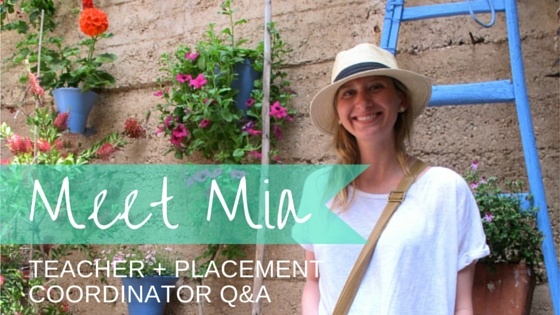Meet Mia! She is one of our incredible Placement Coordinators here at Teach Away. Mia brings to Teach Away her own experience from abroad, having taught English in Spain’s Andalucía region. A year in Spain teaching ESL to 18-20 year-old native Spanish speakers proved to be a challenge, but even more so it was a year that proved to be fun, rewarding, and a great gateway to future career options for Mia.
We had the chance to chat about culture, challenges, language, and advice. Have a read (and note that all these photos were taken during Mia’s trip!):
Describe some differences you noticed between Spanish culture and your own.
Mia: One of the main differences I noticed is that Spanish culture is incredibly artistic. It is normal for the streets to be filled with romantic guitar music and the bars to be buzzing with passionate flamenco dancing. Spain is also home to a number of famous artists and architects, including Picasso and Gaudi, and because of this, you can feel the artistic expression wherever you go.
It’s important for visiting teachers to respect the traditions and cultural practices of their new countries. Were there any unique Spanish traditions that you didn’t know about before arriving?
Mia: Before arriving, I was not aware of the grandiose festivals that Spain is famous for. Spanish people love to party and have wild celebrations. One festival that I was lucky to experience was Las Fallas. During the event, enormous doll-like figures are constructed and displayed throughout the city. At the end of the festival, the figures are lit on fire to a raging party. This is only one example of the rowdy festivals that the country is known for.
(Las Fallas festival)
Were you able to speak any Spanish beforehand and how did your Spanish skills develop during your time abroad?
Mia: Before leaving, I was enrolled in a few Spanish courses. I entered the country with very basic, elementary level Spanish skills. The program that I was involved in allowed me to continue my Spanish education while I was in the country. Learning the language broadened my experience and helped me to build relationships.
How difficult was communicating with your students?
Mia: At times I found communicating with my students to be very challenging. I was fortunate enough to be partnered with a translator, who I was especially grateful for during these times.
Were these language challenges some of the most difficult experiences of living and working in a new country?
Mia: Absolutely. The biggest challenge that I faced was the communication barrier. Although I knew elementary level Spanish, it was difficult maintaining fluent conversation with locals in their own language. It’s important to keep in mind that anyone coming to a new country may experience difficulties in communication. Do not get discouraged because your skills will only improve with practice!
Tell me about the most rewarding aspects of your time in Spain.
Mia: One of the best parts of my time abroad was getting to meet new people and build relationships. I did my best to take advantage of social situations and tried to say yes to everything. As a result, I felt as if I was able to build positive friendships based on mutual interests and understandings. I also found that I learned a lot from my colleagues, students, and roommates about language and culture.
During my time abroad I also traveled extensively throughout Europe. The experiences I had and the friends that I made along the way were some extremely rewarding aspects as well.
What should teachers going abroad for the first time do to best prepare for living somewhere new?
Mia: Research, research, research! It is your job to know where you are going, both geographically and culturally. Knowing specific details about the region of the world that you are about to enter will help you in the long run. Although it may be difficult, try to go into the situation without expectations and with an open mind. Letting go of preconceived notions will ultimately allow you to have the best experience possible.
As a Placement Coordinator at Teach Away, what traits have you noticed to be especially helpful to successful teach abroad candidates
Mia: At Teach Away, we are always looking for individuals who are passionate about teaching, eager to learn, and ready to be challenged. It is our hope that our candidates are flexible and open to new experiences, both in and out of the classroom.
What three pieces of advice would you offer a licensed teacher who has never taught or travelled abroad, but would like to?
Mia: First and foremost, it’s very important that you do your research. Take the time to research all available opportunities and the countries that you are interested in. It may also be beneficial to speak with someone who has already taught or traveled abroad; this may allow you to gain a firsthand perspective or helpful advice. I would also recommend that you remain flexible and open-minded about your geographic location. Try not to limit yourself and be open to more than one location and opportunity. Lastly, candidates need to be open to both professional and personal growth. Do not be afraid to acquire new skills, expand your teaching repertoire and push yourself out of your comfort zone.
For more from experienced overseas teachers, join us tomorrow at 1pm for Passport to Teach’s final day: Teacher Experiences Fireside Chat. We’ll hear from teachers as they share their experiences abroad and you’ll have the opportunity to ask your questions live! Teachers who have taught in China, Egypt, England, and Korea will be joining us.



